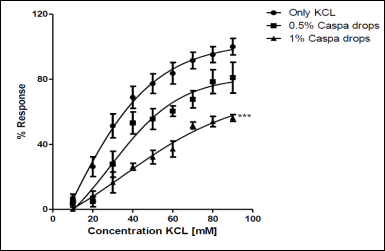Toll Free Helpline (India): 1800 1234 070
Rest of World: +91-9810852116
Free Publication Certificate
Vol. 3, Issue 6 (2014)
Evaluation of acute toxicity and in-vitro anti-spasmodic activity of Caspa drops, an ayurvedic formulation
Author(s):
Maitrey Patel, Nilesh Kanzariya, Hardik Soni, Ghanashyam Patel
Maitrey Patel, Nilesh Kanzariya, Hardik Soni, Ghanashyam Patel
Abstract:
Infantile colic is a very common condition appears to pediatricians. It is also known as baby colic. Common factors involved in the etiopathogenesis of infantile colic are such as intolerance to food like milk protein and lactose; neuro-hormonal immaturity, maternal anxiety etc. Generally, conventional anti-spasmodics (like atropine, dicyclomine, hyoscyamine) are used to treat gastric spasm, but safety is always the major concern in that case. In the present study, an attempt was made to evaluate safety (by acute toxicity study) and efficacy (by In-vitro anti-spasmodic experiment) of Caspa drops – An Ayurvedic proprietary formulation. Acute toxicity study was carried out as per OECD guideline 425. In-vitro anti-spasmodic activity was evaluated by KCl, BaCl2 and Acetylcholine (Ach) induced contraction in rat ileum. Test drug was evaluated for efficacy at two different concentration levels, 0.5% and 1.0%. As per the results, no animal manifested any signs of toxicity during cage side observation and mortality at 20 mL/kg. LD50 of Caspa drops was higher than 20 mL/kg. Caspa drops showed smooth muscle relaxation in a dose dependent manner. 1.0% concentration showed highly significant effect against KCl, BaCl2 and Ach - induced smooth muscle contraction. Test drug was also compared with established conventional standard drugs. From the data it can be assumed that Caspa drops have anti-spasmodic activity through inhibition of muscarinic effect or calcium channel and also it did not manifest any signs of toxicity.
Infantile colic is a very common condition appears to pediatricians. It is also known as baby colic. Common factors involved in the etiopathogenesis of infantile colic are such as intolerance to food like milk protein and lactose; neuro-hormonal immaturity, maternal anxiety etc. Generally, conventional anti-spasmodics (like atropine, dicyclomine, hyoscyamine) are used to treat gastric spasm, but safety is always the major concern in that case. In the present study, an attempt was made to evaluate safety (by acute toxicity study) and efficacy (by In-vitro anti-spasmodic experiment) of Caspa drops – An Ayurvedic proprietary formulation. Acute toxicity study was carried out as per OECD guideline 425. In-vitro anti-spasmodic activity was evaluated by KCl, BaCl2 and Acetylcholine (Ach) induced contraction in rat ileum. Test drug was evaluated for efficacy at two different concentration levels, 0.5% and 1.0%. As per the results, no animal manifested any signs of toxicity during cage side observation and mortality at 20 mL/kg. LD50 of Caspa drops was higher than 20 mL/kg. Caspa drops showed smooth muscle relaxation in a dose dependent manner. 1.0% concentration showed highly significant effect against KCl, BaCl2 and Ach - induced smooth muscle contraction. Test drug was also compared with established conventional standard drugs. From the data it can be assumed that Caspa drops have anti-spasmodic activity through inhibition of muscarinic effect or calcium channel and also it did not manifest any signs of toxicity.

Fig.: Effect of Caspa drops on KCl induced contraction in isolated rat ileum
Pages: 70-76 | 1768 Views 160 Downloads

How to cite this article:
Maitrey Patel, Nilesh Kanzariya, Hardik Soni, Ghanashyam Patel. Evaluation of acute toxicity and in-vitro anti-spasmodic activity of Caspa drops, an ayurvedic formulation. Pharma Innovation 2014;3(6):70-76.






